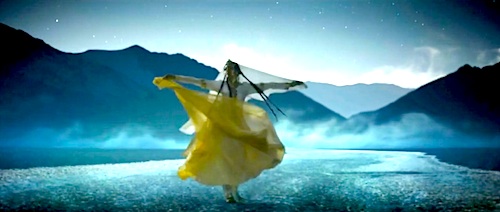Desert Lullabies Trailer-HD from Monely Soltani on Vimeo.
By Joe Bendel. It is tough to be a kid in Iran. It is also hard to live with dignity as a woman and hard to live at all as an LGBT Iranian. Human rights for everyone remains a serious issue in the country, but the potential wartime death of innocence has become an increasingly pressing and universal concern throughout global battlefields. However, California-based filmmaker Monely Soltani explores it from a distinctly Persian perspective in the narrative short film Desert Lullabies, which screens during MIX NYC: the 27th New York Queer Experimental Film Festival.
Tara’s mother Homa has a hard time explaining why her dissident father has not yet returned as he promised. She has an even harder time explaining why they must flee their home at dawn. She has just received a last-minute warning the government imminently plans to raze their rebellious village along with all its inhabitants, but that is an awful lot to burden a young child with.
As she slips into a feverish slumber, Tara will be visited by the spirit of her beloved grandmother and the goddess Anahita, but do not expect a happy ending, per se. Despite Desert’s fable-like vibe, reality still is what it is. Nonetheless, simply carrying on constitutes a victory.
Shot on location in Death Valley, but utilizing extensive green screen work, Desert seems to exist eerily out of time, like some sort of near future-Medieval dystopia. Some of the effects might somewhat reflect Soltani’s presumed budget constraints, but the evocative interiors of Homa’s modest home have a Spartan but tangibly lived-in feel.
While Desert is only fifteen minutes long, Shila Ommi’s performance as Homa packs quite a punch. Based on Soltani’s own mother, she vividly conveys all of Homa’s motherly courage and desperation. As Tara, Ariana Molkara’s work is also unusually sensitive and unaffected. Viewers will definitely believe they are family—a tragically incomplete family.

Soltani does not belabor the particulars of the current regime, but there are enough Iranian signifiers, starting with the Persian dialogue, to cue viewers’ pre-existing context. In fact, it could be seen as part the leading edge of an emerging Persian-American cinema, along with Ana Lily Amirpour’s A Girl Walks Home Alone at Night.
Although Soltani’s previous short documentary won an award from USC’s Lambda Association, Desert would not seem to be a natural fit for MIX NYC, but cheers to them for not being stylistically or thematically dogmatic. Highly recommended, Desert Lullabies also looks like one of the more accessible films in the Ancient Futures program, which screens tonight (11/12) at the 27th MIX NYC.
LFM GRADE: B+
Posted on November 12th, 2014 at 1:16pm.